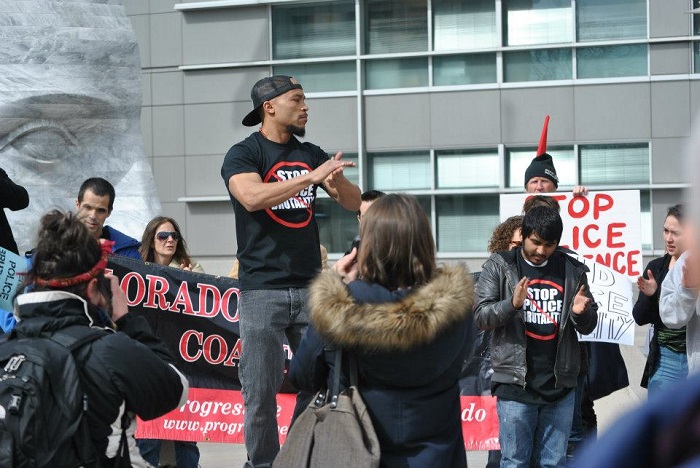
Denver residents held a rally last night in response to public outrage about the killing of a black teenager by police in Ferguson, Missouri.
One young black man from Denver has experienced police violence first hand. In January of 2009, Alex Landau was beaten -- almost to death -- by Denver police. He was driving with a white friend when he was pulled over just east of downtown. The traffic stop escalated quickly, Landau said on StoryCorps last week:
"So I ask them, 'Can I please see a warrant before you continue the search?' " Landau says. "And they grab me and began to hit me in the face. I could hear Addison in the background yelling, 'Stop! Leave him alone.'
"I was hit several times, and I remember gasping for air" and spitting blood, he says.
He required 45 stitches and has been diagnosed with brain injuries. In 2011, he received a settlement of $795,000 from the city.

Landau told "Colorado Matters" host Ryan Warner he sees similarities between his own story and that of Michael Brown, the teenager from Ferguson.
"It's heartbreaking to see a black youth taken in his prime," Landau says. "The pattern is similar, whether it's Ferguson or Denver."
Much has been made out of Ferguson's largely white force in a town that is mostly black. But the relationship between a police department and the community it serves is more than just a racial issue, says Denver Police Capt. Tracie Keesee.
"You don't want to just bring in people of color into police departments. You want to make sure they have the skillset to do the job," Keesee told Warner. "You want to have officers that are good officers."
Reparing relationships
Keesee, who co-founded the Center for Policing Equity to help police recruit and maintain an unbiased police force, says departments should hold community events. Get "out of the cars, onto the streets," Keesee says.
Racial profiling happens, but there are always two sides to each incident, Keesee warns. If an officer on the beat receives a description of a suspect, it will likely include the suspect's race. And the officer will likely target people who fit that description.
Even so, Landau says it's vital for young people to know their rights. He now works with the Colorado Progressive Coalition to do just that.
"I don't believe all officers are bad," Landau says. "[But] we as a community are responsible for standing up for ourselves."
Keesee agrees, and cautions that it can be done without provoking an officer. "Make sure you are not the one aggravating the situation," Keesee says. Something as routine as a traffic stop is nerve-wracking for everyone involved, she says.
Technology, such as police car dashboard cameras, and cameras worn by officers, can help sort out what's happened after the fact. Footage has been instrumental in recent brutality settlements in Denver. But Keesee warns they are expensive and just a piece of the solution.
"Cameras cannot replace human interaction," she says.








